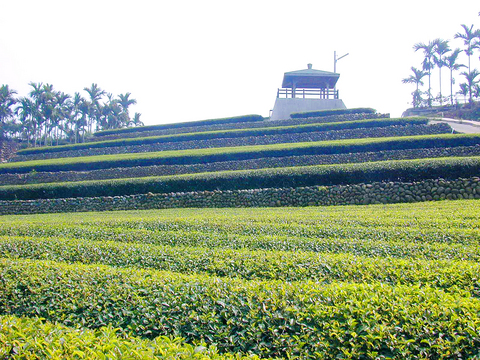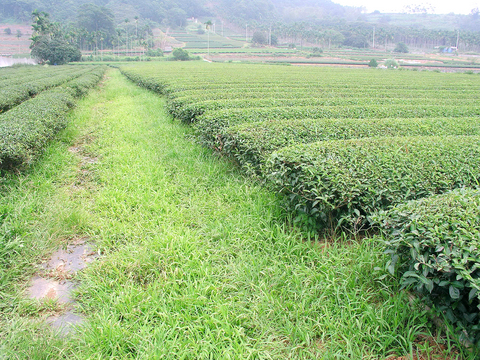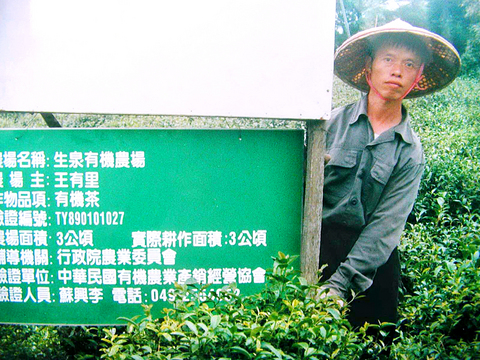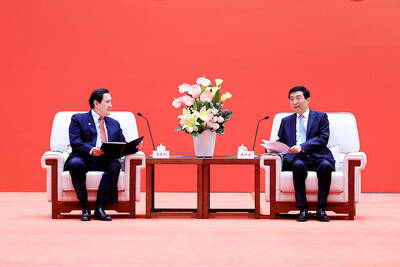In an organic field veiled in the mountain mists of Sindian (新店), Taipei County, towering tea bushes of nearly 30 rare strains enjoy a growing environment in stark contrast to the chemically regulated tea plantations commonly found across the island. Frogs, spiders, birds and all manner of insects thrive in this botanical garden where the equilibrium of Nature keeps weeds and pests in check. "Nature is not a production line … We must comply with the rhythms of nature and merely offer assistance in the right place at the right time," said Chou Hsien-pang (周顯榜), who left his farm fallow for a decade so the soil could recuperate.
Awakening to eco-agriculture
Chou is one of a handful of tea growers in Taiwan that have made the move to ecologically-friendly farming since the country's organic market began to take off in the late 1980s when the Council of Agriculture under the Executive Yuan (COA, 行政院農業委員會) introduced international sustainable organic farming accreditation.

PHOTOS: LU CHANG-PING, TAIPEI TIMES
The COA instituted a basic regulatory framework including Production Standards for Organic Agricultural Products (有機農產品生產規範) and has so far approved four bodies to certify organic products — Mokich Okada International Association (MOA, 國際美育自然生態基金會), Taiwan Organic Production Association (TOPA, 台灣省有機農業生產協會), Taiwan Formosa Organic Association (FOA, 台灣寶島有機農業發展協會) and Tse-Xin Organic Agricultural Foundation (TOAF, 慈心有機農業發展基金會).
Currently, local organic plantations cover 1,300 hectares of land, less than one percent of the nation's total farming capacity, a figure far below most developed countries whose organic cultivation areas usually make up 10 percent of total plantations. As for organic tea fields, there are about 56 plantations in Taiwan that take up roughly 72 hectares of land and most of them are found in Nantou County (南投縣), Chiayi County (嘉義縣) and Taipei County (台北縣), according to statistics released by the COA.
But what exactly does organic tea mean?

The cultivation of organic tea has progressed at a relatively slow rate because Taiwan's climate is conducive to insect infestations, and growers face the geographic restraints of having to work with small plantations that are costly to convert to organic practices. Not only do small farmers shoulder higher production costs but their fields are also liable to be contaminated by pollutants from neighboring farms.
"Not every piece of farming land can be adapted to organic cultivation. Organic fields require buffer zones to prevent chemical pollutants from outside sources reaching the irrigation system, [which] has to be free of chemical and heavy metal substances," said Su Mu-jung (蘇慕容), TOAF vice executive officer.
Prospective organic tea fields need to lie fallow for three years to build up nutrient levels and neutralize the chemical residues left in soils from past cultivation practices. It's out with herbicides, pesticides and chemical fertilizers and in with environmentally-friendly farming techniques.

Weeds are taken care of the old fashioned way, manure is used and leguminous plants are grown to increase the fertility of the soil. Organic fertilizers are more costly than chemical versions since they are low in nitrogen — the main nutrient for tea trees — and require large amounts to fertilize the same area. But a farmer's worst nightmares are bugs.
"Insect management is always the biggest headache and there has not been an effective pest control yet … Growers either employ physical control methods such as using light to trap insects and growing repelling plants or using natural enemies of pests to keep their numbers in check such as predators, parasites and pathogens," said Tsai Yu-jen (蔡右任), head of the Tea Research and Extension Station, Wenshan Branch (茶葉改良場文山分場).
Apart from the labor-intensive work, tea growers also need to keep daily reports for certifying agents who make periodical visits to the fields. "The relations between agents and growers is more like a mutual learning experience. We both learn from each other's mistakes to build a more substantial certification program," said Chou.
Farmers as ecologists
Organic farmers observe the inner workings of the ecological system. "Only the grower knows the ecological resources of his or her field since different environments have different natural systems and one farmer's experience can't entirely transplanted to another's," Tsai said.
Take Chou for example, the 35-year-old organic tea farmer spent the past 16 years creating a self-sustaining ecological system with high biodiversity that doesn't require additional fertilizer. Ground hogs loosen the earth; earthworms' manure provides organic matter and frogs eat pests and are used to predict the weather.
"Herbicide residues can be found in the soil after 20 years and make roots shallow. Conventional farming extorts lives out of tea bushes, cutting down their life-span to seven to 10 years. But if you let the plants grow in the natural way, their roots will go deep into the soil and the leaves will become naturally aromatic and rich in nutrients," Chou explained.
Wang Yu-li (王有里), an organic tea grower in Pinglin (坪林), Taipei County, has also come a long way since switching to organic farming 15 years ago. "To me, the most difficult part is to change your mindset from conventional to organic because it's just heart-wrenching to see your crop yields go down, costs go up and your trees are plagued with diseases and pests … But once you acquire proper management techniques and the ecological system restores its natural balance, the production stabilizes," Wang said.
"Insects come and go and gradually you just don't have the heart to kill the creatures that are part of the environment," said Wang, who merely prunes his trees before insects' breeding seasons to minimize the pest damage.
When it comes to weeding, Wang also has his own philosophy of treating all living things with equal respect. "I weed before the insects' breeding times so as not to disturb them and leave out pieces of weeds so that larvae have places to incubate," said Wang, whose tea garden reportedly has the highest density of fireflies in Taiwan.
Barriers and bottlenecks
Though the small production capacity of organic tea producers in Taiwan can barely meet the domestic market demand, let alone export, individual growers like Wang still have a hard time finding effective marketing channels through which to sell their products. For Su, organic products need to create their own niches rather than following the existing consumers' preferences. "It is commonly agreed that organic tea is inferior [to tea grown using herbicides and pesticides] in taste due to plagues of pests. So instead of wooing taste-oriented consumers, organic tea growers will be better off if they can develop products that appeal to health-conscious shoppers," said Su.
According to Tsai, poor production techniques are the biggest obstacle to overcome before growers can enjoy higher yields and lower production costs. The lack of a fully regulated certification system remains an important issue as consumers remain skeptical about the myriad organic products.
To unify the certification programs, the COA has begun issuing national CAS organic production certification this year in addition to those of the four private agents, but further emendations of the regulations are required if the programs are to be internationally recognized.
All told, local organic tea farming seems to have a long and bumpy road ahead. But for Chou, the high quality of Taiwan's tea is definitely worth the effort. "The island has a very unique natural environment where tea trees can grow between elevations of 500m to 2,600m, which are fit for a wide variety of tea varieties from black tea [fully fermented] to green tea [non-fermented]. Nature has given us such uniqueness," said Chou, a self-made ecologist who travels Taiwan and China studying the language of nature.

The canonical shot of an East Asian city is a night skyline studded with towering apartment and office buildings, bright with neon and plastic signage, a landscape of energy and modernity. Another classic image is the same city seen from above, in which identical apartment towers march across the city, spilling out over nearby geography, like stylized soldiers colonizing new territory in a board game. Densely populated dynamic conurbations of money, technological innovation and convenience, it is hard to see the cities of East Asia as what they truly are: necropolises. Why is this? The East Asian development model, with

Desperate dads meet in car parks to exchange packets; exhausted parents slip it into their kids’ drinks; families wait months for prescriptions buy it “off label.” But is it worth the risk? “The first time I gave him a gummy, I thought, ‘Oh my God, have I killed him?’ He just passed out in front of the TV. That never happens.” Jen remembers giving her son, David, six, melatonin to help him sleep. She got them from a friend, a pediatrician who gave them to her own child. “It was sort of hilarious. She had half a tub of gummies,

The wide-screen spectacle of Formula One gets a gleaming, rip-roaring workout in Joseph Kosinski’s F1, a fine-tuned machine of a movie that, in its most riveting racing scenes, approaches a kind of high-speed splendor. Kosinski, who last endeavored to put moviegoers in the seat of a fighter jet in Top Gun: Maverick, has moved to the open cockpits of Formula One with much the same affection, if not outright need, for speed. A lot of the same team is back. Jerry Bruckheimer produces. Ehren Kruger, a co-writer on Maverick, takes sole credit here. Hans Zimmer, a co-composer previously, supplies the thumping

There is an old British curse, “may you live in interesting times,” passed off as ancient Chinese wisdom to make it sound more exotic and profound. We are living in interesting times. From US President Donald Trump’s decision on American tariffs, to how the recalls will play out, to uncertainty about how events are evolving in China, we can do nothing more than wait with bated breath. At the cusp of potentially momentous change, it is a good time to take stock of the current state of Taiwan’s political parties. As things stand, all three major parties are struggling. For our examination of the